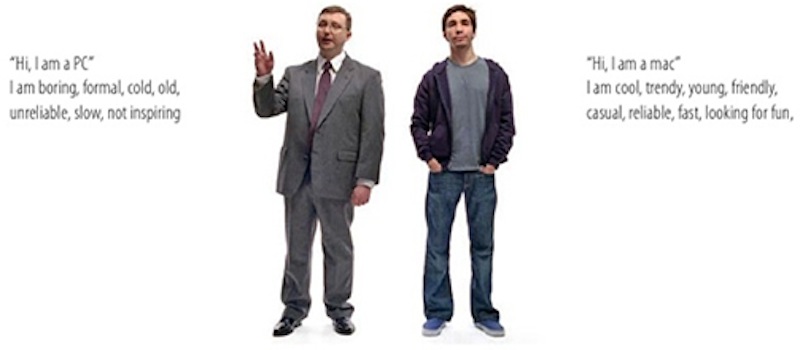
Posted on: September 10, 2013
Posted by: Chelsea Oliver
Categories:
Branding,
Development and tagged
brand development,
brand persona
YaBlog’s previous post on branding defines a brand as “a complex blend of tangible and intangible characteristics,” such as product or service attributes, values, benefits, logos and taglines. Branding is a necessity for all businesses and today I want to discuss the benefits of developing a brand persona – your company, product or service’s own unique personality.
It sounds funny but it really helps to think of your brand as a person. Every person is an individual, with unique characteristics that set them apart. Every person has both physical and psychological attributes (the tangible and intangible mentioned above) that combine to create a distinct personality. A well-developed brand persona is something that can easily be transformed into a character. Apple’s popular “Mac Guy” and the “Geico Gecko” are great examples of this. Personally, I’d love to hang out with either of them. If you’re running through character ideas in your head right now, don’t panic – while you do need to establish an identity for your business, that personality doesn’t need a face to be successful.

Investopedia defines a brand personality as “a set of human characteristics that are attributed to a brand name…something to which the consumer can relate.” There’s no denying that brands are either accepted or rejected by users and that our success rests on the shoulders of those we engage, communicate and work with. It makes sense, then, that consumers have human-like relationships with brands, and putting a figurative or literal face to your name makes you more relatable. Your brand persona is essential in the development of audience perceptions and expectations of your company and reflects your brand promise, which is what customers gain from choosing you. What do you promise your consumers? Whether it’s saving 15 percent or more on your car insurance or the most advanced, trend-savvy technology, your brand persona must reflect that.
Figuring out your company’s personality means realizing which physical and psychological attributes reflect it. If your brand was a person would they be loud or soft-spoken? Outgoing and energetic or laid back? Sarcastic and quick-witted or more on the conservative side? Glasses or no glasses? A business suit or a t-shirt and jeans? Think about the type of clothes your brand would wear and whether it would be found at a coffee shop or a bar on a Friday night. How would it speak to and treat others, and who would want to hang out with it?

Base your answers to these questions on your audience; users are far more likely to choose a company with a brand persona that reflects what they want and need. For example, how inclined would you feel to purchase a website from a digital agency that comes off as a boring, stuffy, dimwitted businessman? Probably not very likely. But a digital agency that comes off as hip, talented and experienced? Now we’re talkin’. When you reach this step, it’s also helpful to take a look at your direct competitors – what they’re doing and how they’re portraying and positioning themselves within your industry.
At the end of the day, your brand’s personality is reflected in every single lead and customer interaction, no matter how big or small. This is why developing and, if necessary, overhauling your company’s persona is so important – establish a personality your clients will be happy to interact with when they connect with you via phone, email, social media or face to face. If you’d like to discuss your small business branding options, don’t hesitate to give us a call.
Image Credits: Salesforce and Writers Win
YaBlog’s previous post on branding defines a brand as “a complex blend of tangible and intangible characteristics,” such as product or service attributes, values, benefits, logos and taglines. Branding is a necessity for all businesses and today I want to discuss the benefits of developing a brand persona – your company, product or service’s own unique personality.
It sounds funny but it really helps to think of your brand as a person. Every person is an individual, with unique characteristics that set them apart. Every person has both physical and psychological attributes (the tangible and intangible mentioned above) that combine to create a distinct personality. A well-developed brand persona is something that can easily be transformed into a character. Apple’s popular “Mac Guy” and the “Geico Gecko” are great examples of this. Personally, I’d love to hang out with either of them. If you’re running through character ideas in your head right now, don’t panic – while you do need to establish an identity for your business, that personality doesn’t need a face to be successful.

Investopedia defines a brand personality as “a set of human characteristics that are attributed to a brand name…something to which the consumer can relate.” There’s no denying that brands are either accepted or rejected by users and that our success rests on the shoulders of those we engage, communicate and work with. It makes sense, then, that consumers have human-like relationships with brands, and putting a figurative or literal face to your name makes you more relatable. Your brand persona is essential in the development of audience perceptions and expectations of your company and reflects your brand promise, which is what customers gain from choosing you. What do you promise your consumers? Whether it’s saving 15 percent or more on your car insurance or the most advanced, trend-savvy technology, your brand persona must reflect that.
Figuring out your company’s personality means realizing which physical and psychological attributes reflect it. If your brand was a person would they be loud or soft-spoken? Outgoing and energetic or laid back? Sarcastic and quick-witted or more on the conservative side? Glasses or no glasses? A business suit or a t-shirt and jeans? Think about the type of clothes your brand would wear and whether it would be found at a coffee shop or a bar on a Friday night. How would it speak to and treat others, and who would want to hang out with it?

Base your answers to these questions on your audience; users are far more likely to choose a company with a brand persona that reflects what they want and need. For example, how inclined would you feel to purchase a website from a digital agency that comes off as a boring, stuffy, dimwitted businessman? Probably not very likely. But a digital agency that comes off as hip, talented and experienced? Now we’re talkin’. When you reach this step, it’s also helpful to take a look at your direct competitors – what they’re doing and how they’re portraying and positioning themselves within your industry.
At the end of the day, your brand’s personality is reflected in every single lead and customer interaction, no matter how big or small. This is why developing and, if necessary, overhauling your company’s persona is so important – establish a personality your clients will be happy to interact with when they connect with you via phone, email, social media or face to face. If you’d like to discuss your small business branding options, don’t hesitate to give us a call.
Image Credits: Salesforce and Writers Win






